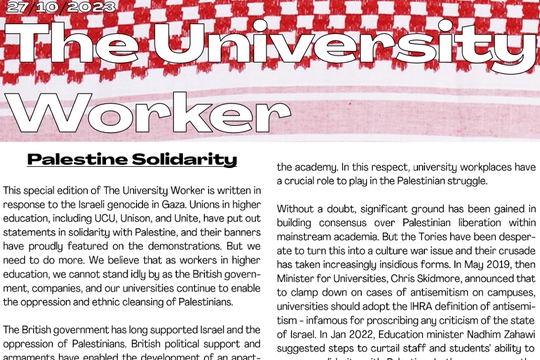The University Worker: 28th November 2023

bulletins
The University Worker: 28th November 2023
by
The University Worker
/
Nov. 28, 2023
The wave of redundancies
The University Worker is a rank-and-file bulletin made by university workers, that has been produced since 2018. This is a special edition on the wave of redundancies in higher education, published on the 28th of November 2023.
Editorial: The Wave of Redundancies
In this edition of the University Worker Bulletin, we have collected reports from universities that have recently undergone or are undergoing redundancies. In the last two bulletins, we have focused on solidarity efforts within UK universities responding to the bombardment of Palestine. We don’t intend to shift attention away from this urgent struggle. Instead, we want to ask how this recent spate of redundancies connects to the struggle for Palestinian liberation? And more broadly, how do we politically articulate the need to struggle on both the economic and political front during this local and global crisis?
At this point, most of us are aware that marketisation is systematically eroding our working conditions. We work longer for less, and some of us never escape the temp-work treadmill. The increasing regularity of compulsory redundancies across the sector is part of this same process. Jobs are being cut, we are told, because costs are rising, recruitment is plateauing and the fee caps offer no room for manoeuvre. Regardless of whether these justifications are legitimate, benchmarks for controlling university finances have made downsizing a certainty in a winner-takes-all market. This is only the beginning of this tendency.
These cuts have particularly ravaged arts and humanities subjects. This is no coincidence. The government’s threats to punish providers of so-called ‘low quality’ degrees have heightened anxieties among senior managers. Holding humanities subjects in institutional portfolios is now seen as a long-term liability. Ironically, it is Business Management courses which score the lowest according to the metrics used to define degree quality in the eyes of the government.
However, the ideological nature of these cuts only tells half the story of what’s happening in HE. The other side of the story has been revealed in recent efforts to force universities to divest from partnerships with arms companies, showing the extent to which university finances are tied up with the Israeli state war machine. When we think about the marketisation of HE, we tend to think it’s bad because it forces universities to operate as businesses. Running an educational institution for profit fundamentally constrains the conditions for teaching and research. But when a public resource is subsumed to the market, it does not enter a neutral field of economic relations. Rather, it becomes liable for the political ends served by those economic relations. As more pressure is put on universities to compete for new income sources, Britain’s military-industrial complex, fossil fuel companies, and financial services have become the reliable big investors in the sector. These are the same companies staving off Britain’s general economic decline by pursuing extractive ventures around the world. In this way, the enforcement of market solutions to the funding crisis in HE has made universities increasingly dependent upon the interests of British imperialism.
This contradiction is showing itself quite clearly in the case of Oxford Brookes. Before announcing widespread staffing cuts across humanities programmes, the university launched its new Defence & Security Research centre. A promotional blurb on the university’s website describes the centre’s aims: ‘to respond to and offer solutions to current and emerging threats identified by the Government and its allies.’ The decimation of the arts and humanities (soon to be followed by the social sciences) is taking place while STEM subjects are being leveraged to attract corporate funding and directly serve hawkish foreign policy objectives. The complicity of the British government in the genocide of Palestinians is forcing us all to confront this compromise position. The question is: how will university workers respond?
If the relentless deterioration of our working conditions has not got us asking ‘what are we contributing to?’, recent events make questions of the social and political function of university work unavoidable.
Oxford Brookes
On 15 November, senior management at Oxford Brookes University announced its intentions to make compulsory redundancies across Anthropology, English and Creative Writing, History, Film, Publishing and Architecture and to permanently close its Music and Maths programme. The stated aim of the cuts is to make £3m savings between ‘23-25 to address the university’s existing deficit. Senior management say a combination of flat home undergraduate student fees since 2012, inflationary pressures, increases in pay agreed at national level and increased pension contributions, are taking the whole sector into a financially unsustainable position, and this means preemptive cost-saving measures have become unavoidable to secure the institution’s future. This is despite Brookes registering a surplus of £6.3m and acknowledging that recruitment has been a success this year.
Currently, the size and shape of the cuts and the number of staff affected are not fully known. It has been estimated that around 56 staff will be affected, with up to 48 posts at risk, and the majority of compulsory redundancies will affect professorial staff. In some cases, staff members have been individually pooled for the redundancy selection process, meaning their redundancy is unavoidable. Immediate cost-saving measures have involved offloading all Associate Lecturers working in these areas.
The speed with which Oxford Brookes management is pushing these cuts through is especially hair-raising. An all-staff email was sent out on Wednesday (15th) announcing the redundancy programme and individual consultation meetings with affected staff started the following day. Both UCU and UNISON branches were formally made aware of the redundancy programme on the same day as staff. This is clearly insufficient notice and has been calculated to prevent the UCU branch from effectively representing its members. The cuts are scheduled to be complete by mid to late January 2024. The UCU branch has passed a no confidence vote in the Vice Chancellor’s ability to manage the university’s finances. The union executive has demanded the threat of redundancies be withdrawn before taking further steps including industrial action.
University of Aberdeen
University of Aberdeen is threatening to axe all Modern Languages degrees with multiple redundancies. The Modern Languages Dept is the home of 3 out of 4 of our women professors in the School of Language, Literature, Music & Visual Culture. Not to mention being at the centre of our Decolonising endeavours. Any one who thought EDI was just lip service and virtue signalling … is right.
Brighton
‘It’s not an easy time to be a UCU Higher Education (HE) activist,’ a friend recently said to me. Understatement of the year! In the same week that UCU failed to reach their aggregated ballot threshold potentially halting national action for the foreseeable future, the longest strike of UK academic staff in HE history, which took place at Brighton University, ended without them winning their dispute. This certainly was a tough pill to swallow and clearly further reflection is needed. However, in my experience I have met few union reps who work as hard or give as much as those at Brighton. While some might call the Brighton strike a defeat it is to me one of the most beautiful acts of defiance I’ve witnessed, and been a part of, over my lifetime.
The management at Brighton waited until the end of the previous academic year to spring their proposal for compulsory redundancies on the branch, hoping to sneak this through over the summer. After a quick trawl of voluntary redundancies that received 80 takers in just two weeks, management isolated 25 people for the compulsory chop. These choices were part of a political attack on the University with the Pro-Vice Chancellor for Research Rusi Jaspal, himself a failed Conservative councillor, helping to ideologically cleanse the University of left-wing thought. They targeted incredible lecturers who researched topics such as feminism and care, and the history of colonialism. Colleagues who had given their academic lives to Brighton, building innovative research centres and departments, were unceremoniously thrown out on their behind. Faced with this kind of academic vandalism and cruelty the branch immediately stood up and said no. And soon began an indefinite strike.
Perhaps part of the strange beauty of this action was that some of those who took part weren’t convinced the strike would bring their colleagues back. They were just so disgusted at these needless attacks that they could not stomach working for the University under these conditions and wanted to show as much solidarity with their colleagues as possible. To me this is true integrity; not just having strong principles, but standing up for them regardless of the costs.
Members put up a brave fight staying out for 129 days. Most of those chosen for compulsory redundancy had worked their notice by 20 October. Members of Brighton UCU returned to work on 10 November. By this time it was clear our colleagues had either got other jobs, were working their way to tribunals, or were not going to be taken back by a University dead set on destroying some of its most beloved areas.
We certainly gave the managers hell. The University would have already been in chaos with 10% of staff gone, but with our strike we shut down teaching over many courses for nearly half the semester. We showed the VC Debra Humphris up for her erratic and bullying management style with which 94% of staff and students disapproved. We disrupted talks by senior managers at major events. We even garnered national media attention with the Guardian calling the University’s decision disgraceful and outrageous. Supportive students occupied University buildings - twice - with one demand… No redundancies.
We faced many challenges over the strike. It was difficult being trapped between local and national action. For a good deal of our indefinite action we were simultaneously withdrawing our labour due to the national MAB, for which we were deducted 100% of our wage, as well as the strike over redundancies. In the last weeks of the strike some felt their courses were being threatened with closure, particularly in the areas where the University was already reducing their provision. In an act of desperation management started threatening reps with disciplinaries for trespassing on University property and behaviour on the picket line that would be considered completely normal elsewhere. The victimisation of members and reps could clearly be fought, but it added extra pressure especially after our comrades had worked their last day. Many felt it would have been helpful to have further support from UCU HQ. It seemed clear that after the strike went into its second half and the national ballot lapsed there was a distancing. No longer were we in the Friday email sent to all members. No more visits from the GS after the first in July. Thankfully individual branches and supporters continued to help us to the very end.
So what was won? We returned to work without settling the dispute. Our ‘greylisting’ boycott still stands and we will be supporting colleagues through tribunals. Our determination to fight continues and management will think twice about pushing through redundancies again. Two Deans have left the University and the VC seems like she may be on her way out. After we agreed to return to work, management lowered our MAB deductions, a sign that they are worried about the future. True we didn’t save our colleagues, but there is a determination to fight with a deep fire that I’ve rarely witnessed. Next week a student staff forum, created over the strike, will write an alternative manifesto for the University. Perhaps this could be the beginning of a radical refusal at Brighton rather than the end.
Goldsmiths
At Goldsmiths we faced a brutal program of redundancies and restructure in the 2021/22 academic year. After a gruelling local dispute we were unable to stop the program completely; many colleagues left through voluntary severance or were made redundant. In the aftermath, both academic and administrative workers have been severely overworked, trying to keep the university going despite the unworkable structures imposed by management.
This academic year, senior management announced a deficit of around 15 million pounds. This figure has appeared after predictions of a small surplus earlier this year, and seems to be the result of catastrophic administrative failures, particularly in enrolment, directly linked to the restructure.
The last years’ industrial disputes have been very disruptive; while they have not been victories from any perspective they have restricted the possibilities for the most directly anti-worker measures management can take to cover for their own blundering. Instead, we are seeing more subtle attacks on our working conditions. While management have not yet shared the full extent of their plans, the cost-saving measures seem to be focused on narrowing the curriculum, outsourcing of pre-sessional teaching and language provision, and the reduction of associate lecturer budgets by increasing the teaching loads of permanent staff. No mass redundancies, but an increase in already higher workloads, less work for casualised staff, more crowded classrooms and an impoverished curriculum for students. It’s hard to understand how any of these measures will meaningfully lead to a surplus, so it’s not unlikely we will be faced with redundancies again soon.
Since 2021/22, Goldsmiths has been directly subject to diktat from banks Natwest and Lloyds (always by your side) due to a deal negotiated by management that commits the university to running a year-on-year surplus or cede its estate to the creditors. This deal is emblematic of the positioning of Goldsmiths in the current climate. With few prospects for shifting the university towards a more profitable and politically-aligned STEM focus, Goldsmiths is being stripped for copper. The legislative climate around higher education and the so-called culture wars allow senior management to foster a constant sense of crisis. The solution to these spiralling crises is an ever-expanding army of private companies and consultants, as well as a highly paid (and growing) senior management team, all helping themselves generously to students’ tuition fees while accusing staff of not working hard enough.
Academic autonomy and workers’ control of the production process are obstacles to this extractive managerialism, and are attacked through top-down curriculum reform and administrative centralisation designed to make all workers at Goldsmiths replaceable. Political repression of student and worker dissent fits seamlessly with this; in 2021/22, for instance, the university rid itself of all of its historians of the Middle East on the grounds of their financial unviability at the same time as they were forcing through the IHRA definition of anti-semitism and persecuting an elected students’ union officer for their principled stance on Palestinian liberation. At Goldsmiths, political repression wears the guise of efficiency savings.
We encourage workers to share their own reports and ideas for action by filling out the form here. You can also join the WhatsApp announcement group for The University Worker by clicking here.
author
The University Worker
Subscribe to Notes from Below
Subscribe now to Notes from Below, and get our print issues sent to your front door three times a year. For every subscriber, we’re also able to print a load of free copies to hand out in workplaces, neighbourhoods, prisons and picket lines. Can you subscribe now and support us in spreading Marxist ideas in the workplace?
Read next

The University Worker: 4th November 2023
by
The University Worker
/
Nov. 4, 2023

